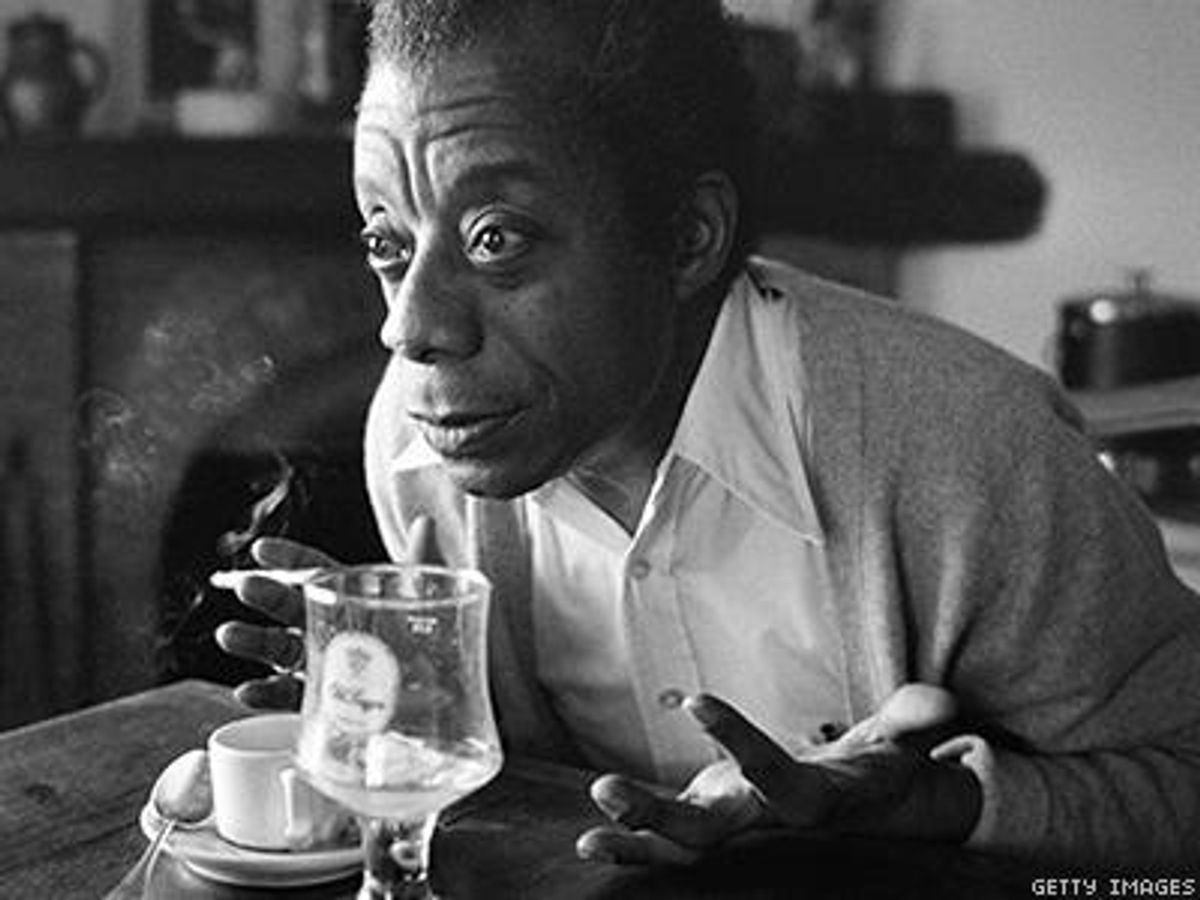James Baldwin, a black and gay literary lion known for classics like Giovanni's Room and Go Tell It on the Mountain, was a prescient speaker on civil rights. Though Baldwin lived throughout the early and mid-20th century, his quotations, particularly from his farsighted book The Fire Next Time, still ring with timeless truth when applied to race issues in America.
Take a look at five quotes from the late gay icon, which were used by activists and publications to describe the incendiary decision not to indict Darren Wilson, the white police officer who shot and killed unarmed black teenager Mike Brown in Ferguson, Mo., and its aftermath.
1. "Hatred, which could destroy so much, never failed to destroy the man who hated, and this was an immutable law."
Wilson Cruz, a gay actor on Fox's Red Band Society and a spokesperson for GLAAD, cites The Fire Next Time, a book of essays by Baldwin that addresses race throughout American history. The quote, which Cruz posted to Twitter and Facebook with the hashtag #Ferguson, attests to how hatred, when applied to both a person and society, is ultimately self-destructive.
2. "One day, to everyone's astonishment, someone drops a match in the powder keg and everything blows up."
Urban Cusp, an online magazine on urban culture and activism, posted this quote to its Facebook profile, which foretells how racial tension and inequality is a "powder keg" just waiting to explode.
3. "It wasn't so much a matter of choosing France -- it was a matter of getting out of America." - James Baldwin, 1984 interview with The Paris Review.
In The Huffington Post, writer Malek Mouzon drew attention to the expression, "Is it time to do a James Baldwin?" which references the American's author and social activist's move to Paris "after becoming so worn down by the racism and homophobia he faced." Mouzon, who is also black and gay, expresses his desire to do what Baldwin did in 1948: become an expatriate from a nation that discriminates against him.
"The racism that James Baldwin knew and ultimately made him leave the country isn't really gone," Mouzon notes. "It's just changed its form. It's become a thing no one talks about and no wants to admit still shapes people's ideas, values and actions. And I don't believe that my colorful, fun-looking outfits; soft-spoken voice and polite manners would keep me from meeting the same fate if I found myself in the wrong part of the country. I may not look like a thug or an asshole but I am still black. And for more people than I would have ever thought the threat people of my skin pose is enough of a justification to end a life. And so, I have to be honest... now more than ever, is it time to do a James Baldwin? Is it time to take my chances abroad?"
4. "It will be hard, James, but you come from sturdy peasant stock, men who picked cotton and dammed rivers and built railroads and in the teeth of the most terrifying odds achieved an unassailable and monumental dignity."
During an interview with Rev. Jesse James, CNN reporter Don Lemon also referenced a line from Baldwin's The Fire Next Time, saying how even "in the teeth of the most terrifying odds," protestors like James and Martin Luther King, Jr., were able to protest peacefully.
"What has changed in our culture and our society that people resort to things that played out here last night in Ferguson?" Lemon asked Jackson, who replied with indignation:
"You do know that when Dr. King was alive we had the Watts riots and the Newark riots and the Detroit riots and Chicago?" Jackson said in a CNN video posted to Mediaite. "And there was a comprehensive study done... that determined a body of pain and fuel of poverty, which is a weapon of mass destruction, precipitated by police action, triggered those riots?"
5. "This innocent country set you down in a ghetto in which, in fact, it intended that you should perish... You were born into a society which spelled out with brutal clarity, and in as many ways as possible, that you were a worthless human being. You were not expected to aspire to excellence: you were expected to make peace with mediocrity."
Dr. Wilmer Leon, a Sirius XM radio host, wrote an op-ed for the Forward Times, a Houston paper for the local African-American community, which begins with this block quotation from The Fire Next Time.
The opinion piece was written in anticipation of the verdict, but it places the modern "rebellions and uprisings" in a broader, historical context than mainstream media, which he feels portrays these incidents in a vacuum.
"The rebellions are not just reactions to the continued shootings and beatings of innocent unarmed African-American men," he notes. "[T]hey are reactions to the powerlessness that the community feels in its inability to put a stop to them."


















































































Fans thirsting over Chris Colfer's sexy new muscles for Coachella